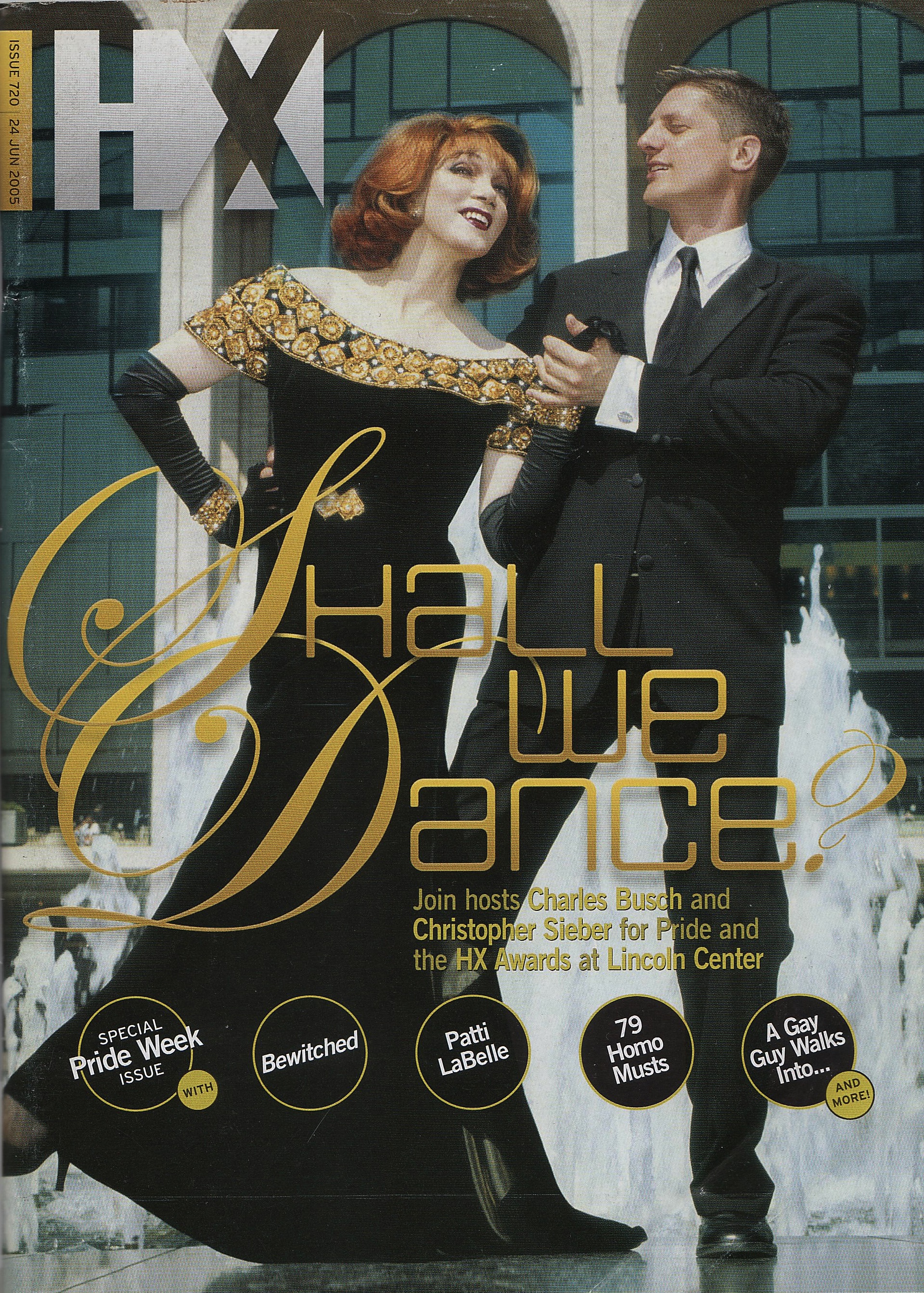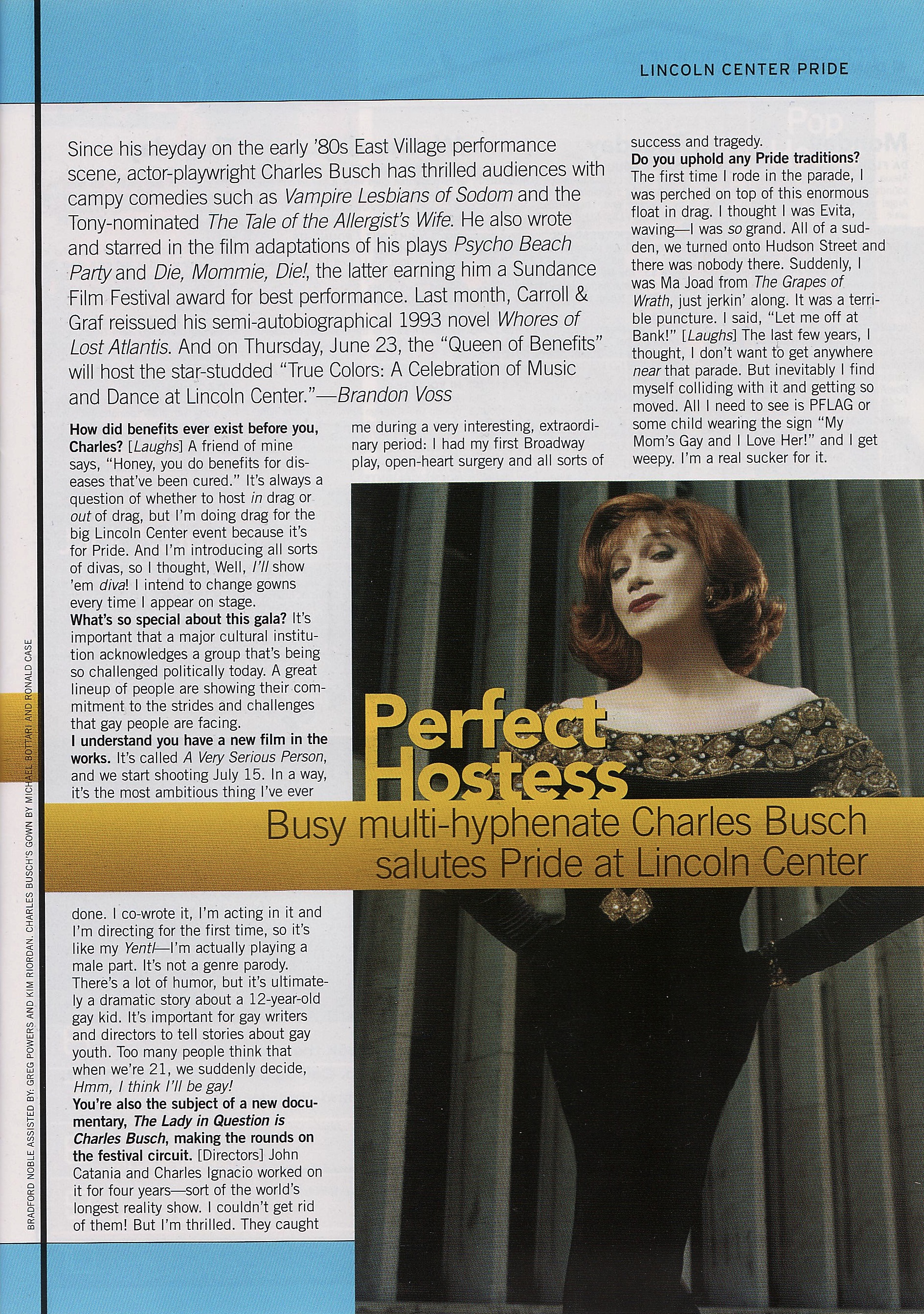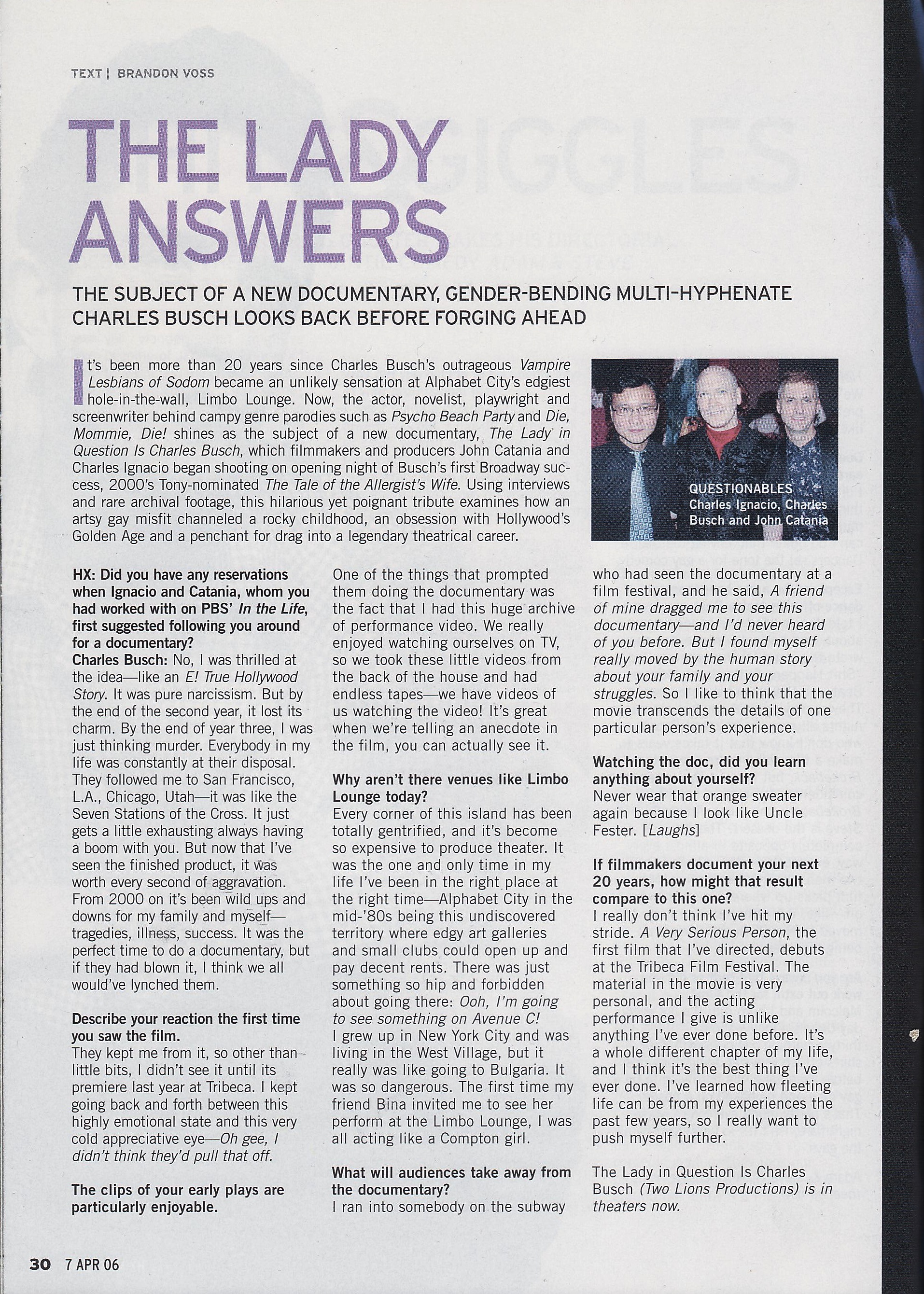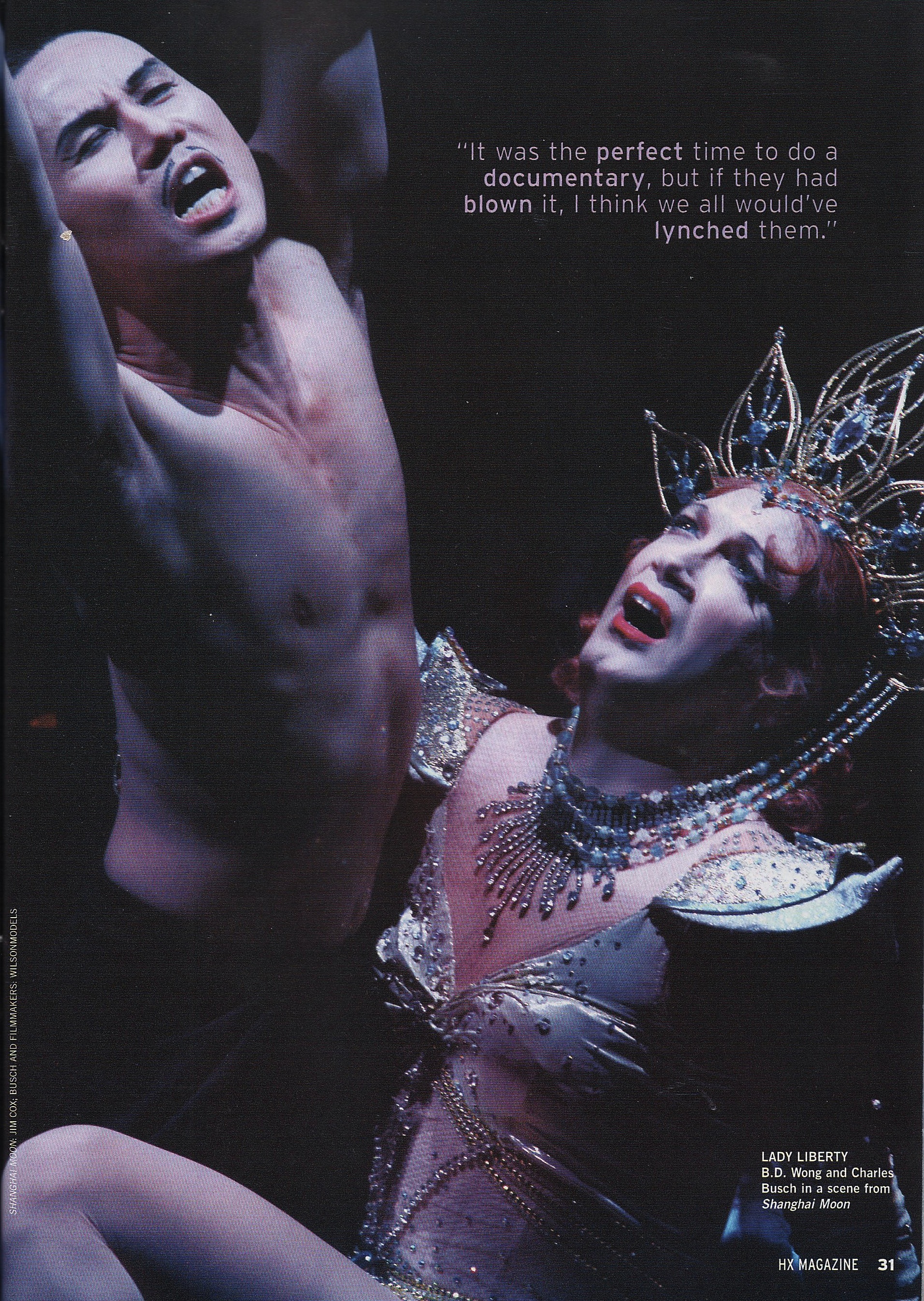



Perfect Hostess: Busy multi-hyphenate Charles Busch salutes Pride at Lincoln Center.
By Brandon Voss
Since his heyday on the early ’80s East Village performance scene, actor-playwright Charles Busch has thrilled audiences with campy comedies such as Vampire Lesbians of Sodom and the Tony-nominated The Tale of the Allergist’s Wife. He also wrote and starred in the film adaptations of his plays Psycho Beach Party and Die, Mommie, Die! (the latter earning him a Sundance Film Festival Award for Best Performance), and last month Carroll & Graf reissued his semi-autobiographical 1993 novel, Whores of Lost Atlantis. Now, on June 23, the “Queen of Benefits” will host the star-studded True Colors: A Celebration of Music and Dance at Lincoln Center.
HX: How did benefits ever exist before you, Charles?
Charles Busch: [Laughs] A friend of mine says, “Honey, you do benefits for diseases that’ve been cured.” It’s always a question of whether to host in drag or out of drag, but I’m doing drag for the big Lincoln Center event because it’s for Pride. And I’m introducing all sorts of divas, so I thought, Well, I’ll show ’em diva! I intend to change gowns every time I appear on stage.
What’s so special about this gala?
It’s important that a major cultural institution acknowledges a group that’s being so challenged politically today. A great lineup of people are showing their commitment to the strides and challenges that gay people are facing.
I understand you have a new film in the works.
It’s called A Very Serious Person, and we start shooting July 15. In a way, it’s the most ambitious thing I’ve ever done. I co-wrote it, I’m acting in it and I’m directing for the first time, so it’s like my Yentl — I’m actually playing a male part. It’s not a genre parody. There’s a lot of humor, but it’s ultimately a dramatic story about a 12-year-old gay kid. It’s important for gay writers and directors to tell stories about gay youth. Too many people think that when we’re 21, we suddenly decide, Hmm, I think I’ll be gay!
You’re also the subject of a new documentary, The Lady in Question Is Charles Busch, making the rounds on the festival circuit.
[Directors] John Catania and Charles Ignacio worked on it for four years — sort of the world’s longest reality show. I couldn’t get rid of them! But I’m thrilled. They caught me during a very interesting, extraordinary period: I had my first Broadway play, open-heart surgery, and all sorts of success and tragedy.
Do you uphold any Pride traditions?
The first time I rode in the parade, I was perched on top of this enormous float in drag. I thought I was Evita, waving — I was so grand. All of a sudden, we turned onto Hudson Street and there was nobody there. Suddenly, I was Ma Joad from The Grapes of Wrath, just jerkin’ along. It was a terrible puncture. I said, “Let me off at Bank!” [Laughs] The last few years, I thought, I don’t want to get anywhere near that parade. But inevitably I find myself colliding with it and getting so moved. All I need to see is PFLAG or some child wearing the sign “My Mom’s Gay and I Love Her!” and I get weepy. I’m a real sucker for it.
HX, June 2005.
The Lady Answers: The subject of a new documentary, gender-bending multi-hyphenate Charles Busch looks back before forging ahead.
By Brandon Voss
It’s been more than 20 years since Charles Busch’s outrageous Vampire Lesbians of Sodom became an unlikely sensation at Alphabet City’s edgiest hole-in-the-wall, Limbo Lounge. Now, the actor, novelist, playwright, and screenwriter behind campy genre parodies such as Psycho Beach Party and Die, Mommie, Die! shines as the subject of a new documentary, The Lady in Question Is Charles Busch, which filmmakers and producers John Catania and Charles Ignacio began shooting on opening night of Busch’s first Broadway success, 2000’s Tony-nominated The Tale of the Allergist’s Wife. Using interviews and rare archival footage, this hilarious yet poignant tribute examines how an artsy gay misfit channeled a rocky childhood, an obsession with Hollywood’s Golden Age, and a penchant for drag into a legendary theatrical career.
HX: Did you have any reservations when Ignacio and Catania, with whom you had worked on PBS’ In the Life, first suggested following you around for a documentary?
Charles Busch: No, I was thrilled at the idea — like an E! True Hollywood Story. It was pure narcissism. But by the end of the second year, it lost its charm. By the end of year three, I was just thinking murder. Everybody in my life was constantly at this disposal. They followed me to San Francisco, L.A., Chicago, Utah — it was like the Seven Stations of the Cross. It just gets a little exhausting always having a boom with you. But now that I’ve seen the finished product, it was worth every second of aggravation. From 2000 on it’s been wild ups and downs for my family and myself — tragedies, illness, success. It was the perfect time to do a documentary, but if they had blown it, I think we all would’ve lynched them.
Describe your reaction the first time you saw the film.
They kept me from it, so other than little bits, I didn’t see it until its premiere last year at Tribeca. I kept going back and forth between this highly emotional state and this very cold appreciative eye — Oh, gee, I didn’t think they’d pull that off.
The clips of your early plays are particularly enjoyable.
One of the things that prompted them doing the documentary was the fact that I had this huge archive of performance video. We really enjoyed watching ourselves on TV, so we took these little videos from the back of the house and had endless tapes — we have videos of us watching the video! It’s great when we’re telling an anecdote in the film, you can actually see it.
Why aren’t there venues like Limbo Lounge today?
Every corner of this island has been totally gentrified, and it’s become so expensive to produce theater. It was the one and only time in my life I’ve been in the right place at the right time — Alphabet City in the mid-’80s being this undiscovered territory where edgy art galleries and small clubs could open up and pay decent rents. There was just something so hip and forbidden about going there: Ooh, I’m going to see something on Avenue C! I grew up in New York City and was living in the West Village, but it really was like going to Bulgaria. It was so dangerous. The first time my friend Bina invited me to see her perform at the Limbo Lounge, I was all acting like a Compton girl.
What will audiences take away from the documentary?
I ran into somebody on the subway who had seen the documentary at a film festival, and he said, “A friend of mine dragged me to see this documentary — and I’d never heard of you before. But I found myself really moved by the human story about your family and your struggles.” So I like to think that that movie transcends the details of one particular person’s experience.
Watching the doc, did you learn anything about yourself?
Never wear that orange sweater again because I look like Uncle Fester. [Laughs]
If filmmakers document your next 20 years, how might that result compare to this one?
I really don’t think I’ve hit my stride. A Very Serious Person, the first film that I’ve directed, debuts at the Tribeca Film Festival. The material in the movie is very personal, and the acting performance I give is unlike anything I’ve done before. It’s a whole different chapter of my life, and I think it’s the best thing I’ve ever done. I’ve learned how fleeting life can be from my experiences the past few years, so I really want to push myself further.
HX, April 2006.
